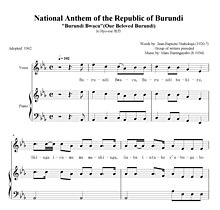Burundi bwacu, Burundi buhire,
Shinga icumu mu mashinga,
Gaba intahe y'ubugabo ku bugingo.
Warapfunywe ntiwapfuye,
Warahabishijwe ntiwahababuka.
Uhagurukana, uhagurukana, uhagurukana ubugabo urikukira.
Komerwa amashi n'amakungu,
Uhabwe impundu n'abawe,
Isamirane mu mashinga,
isamirane mu mashinga.
Burundi bwacu, ragi rya ba sokuru,
Ramutswa intahe n'ibihugu,
Ufatanije ishaka n'ubuhizi;
Vuza impundu wiganzuye uwakuganza uwakuganza.
Burundi bwacu, mpora mutima kuri twese,
Tugutuye amaboko, umutima n'ubuzima,
Imana yakuduhaye ikudutungire.
Horana ubumwe n'abagabo n'itekane.
Sagwa n'urweze, sagwa n'amahoro meza.
|
Burŭndi bwâcu, Burŭndi buhĭre,
Shīnga icúmu mu mashīnga,
Gaba intăhe y'úbugabo ku bugīngo.
Warápfunywe ntiwapfûye,
Waráhabīshijwe ntiwahababuka,
Uhagurukana, uhagurukana, uhagurukana, ubugabo urîkūkira.
Komerwa amáshi n'ámakūngu,
Hābwa impŭndu n'âbâwé,
Isāmírane mu mashīnga,
isāmírane mu mashīnga.
Burŭndi bwâcu, rági ry'ábasôkúru,
Ramutswa intăhe n'íbihúgu,
Ufátanije ishaka n'ubúhizi;
Vuza impŭndu wĭgānzūye uwakúgānza uwakúgānza.
Burŭndi bwâcu, nkóramútima kurí twëse,
Tugutūye amabóko, umutíma n'úbuzima,
Imâna yakúduhāye ikudútūngire.
Horana ubúmwe n'ábagabo n'ítĕkāne.
Sāgwa n'úrwĕze, sāgwa n'ámahóro mēzá.
|
[bu.ɾúː.ndi bɡá.t͡ʃu bu.ɾúː.ndi bu.híː.ɾe]
[ʃiː.ŋg‿i.t͡ʃú.mu mu ma.ʃiː.ŋga]
[ga.b‿i.nháː.he jú.bu.ga.bo ku bu.giː.ŋgo]
[wa.ɾá.p͡fu.ɲŋwe nhi.wa.p͡fú.je]
[wa.ɾá.ha.biː.ʃi.ʒɡwe nhi.wa.ha.ba.bu.ka]
[u.ha.gu.ɾu.ka.n‿u.ha.gu.ɾu.ka.n‿u.ha.gu.ɾu.ka.n‿u.bu.ga.b(o)‿u.ɾí.kuː.ki.ɾa]
[ko.me.ɾɡw‿a.má.ʃi ná.ma.kuː.ŋgu]
[haː.bɡ‿i.mhúː.ndu ná.bá.w‿]
[‿i.saː.mí.ɾa.ne mu ma.ʃiː.ŋg‿]
[‿i.saː.mí.ɾa.ne mu ma.ʃiː.ŋga]
[bu.ɾúː.ndi bɡá.t͡ʃu ɾá.gi ɾɟá.ba.só.kú.ɾu]
[ɾa.mu.t͡skw‿i.nháː.he ní.bi.hú.g‿]
[u.fá.ta.ni.ʒ‿i.ʃa.ka nu.bú.hi.zi]
[vu.z‿i.mhúː.ndu wíː.gaː.nzuː.j‿u.wa.kú.gaː.nz‿u.wa.kú.gaː.nza]
[bu.ɾúː.ndi bɡá.t͡ʃu ŋxó.ɾa.mú.ti.ma ku.ɾí tkwéː.se]
[tu.gu.tuː.j(e)‿a.ma.bó.ko u.mu.tí.ma nú.bu.zi.ma]
[i.má.na ja.kú.du.haː.je‿i.ku.dú.tuː.ngi.ɾe]
[ho.ɾa.n‿u.bú.mŋe ná.ba.ga.bo ní.téː.kaː.ne]
[saː.gwa nú.ɾɡwéː.ze saː.gwa ná.ma.hó.ɾo meː.zá]
|


